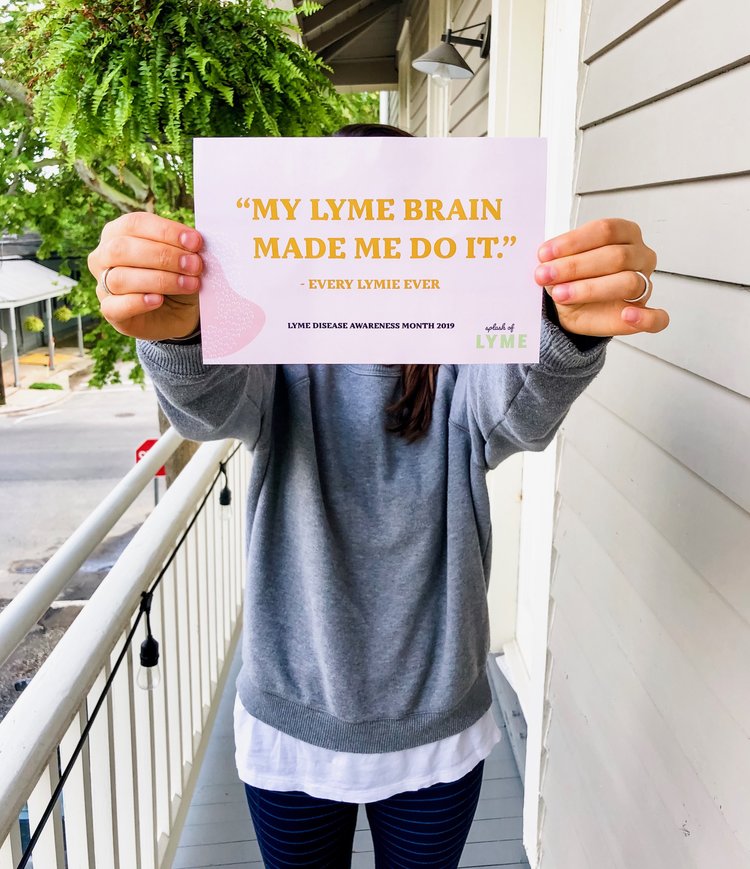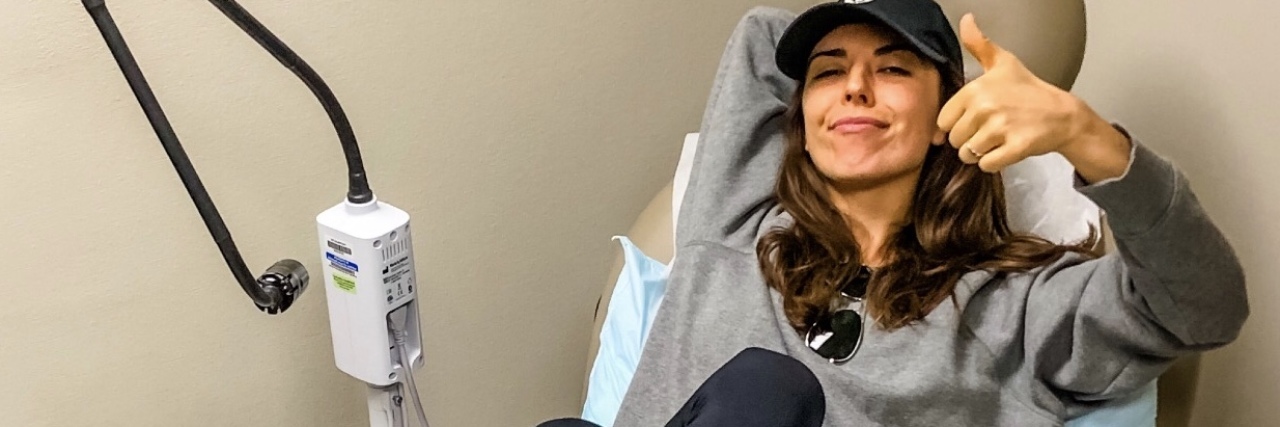As you might have seen around the Internet, May was Lyme Disease Awareness Month and if you’d told me last year that I’d be a part of the #lymie squad in 2019, I never would have believed you.
I would have thought, “but I don’t live on the east coast?” “I don’t think I ever had a bullseye rash?” “If that was part of my story, someone would have caught it by now?” “I don’t think I match the classic Lyme symptoms…”
But, here we are, and here I am: fighting Lyme disease alongside a group of seriously inspiring warriors and sharing my story to help promote awareness of this wildly misunderstood and under-researched illness.
Today, I’m breaking down the basics of what I’ve learned and accepted about Lyme since my diagnosis in January. Often nicknamed “the great imitator,” Lyme literally masks itself as hundreds of conditions and many (like myself) go through years of other treatments and declining health until being correctly diagnosed. Once you know you have Lyme, the treatment can be as confusing as the road to diagnosis — an overwhelming sea of options and contradictory information on best practices.
Anyway, onto my “Lyme Nine” — nine things I have learned about Lyme disease:
1. Every single person will have a different experience of Lyme disease.
A combination of genetic, environmental and situational factors impact how and when the body responds to a Borellia (Lyme bacteria) invasion. Use the people and resources around you for support and information gathering, but know your story will not match anyone else’s completely, and that is OK.
2. Lyme disease can have cyclical symptoms.
You are not “crazy” for feeling like your physical (and sometimes emotional) health is a game of “spin the wheel” or “whack-a-mole.” In fact, one of the most common aspects of Lyme disease is just that it presents in exactly that way. Symptoms are ever-changing, difficult to predict and cyclical in nature. A good morning can take a sharp turn at the drop of a hat, and specific symptoms (like migraine attacks, joint pain, brain fog, bladder pain, etc…) can flare for days, weeks or months at a time without any clear “reason.” This often leads to jumping around from specialist to specialist trying to figure out what exactly is causing each particular flare or symptom and can hinder the process of getting to the broader Lyme diagnosis.
3. There are Lyme-literate doctors and experts who have devoted their lives and careers to fighting this illness.
Seek them out; they exist. Although Lyme disease treatment is not yet mainstream and understood by many large medical centers, there are people who can and will help you. Look for an LLMD (Lyme-literate medical doctor) in your area, or consider working remotely with someone if that is more applicable to your situation. It’s incredibly common for people with Lyme disease to see 10-plus practitioners before being properly diagnosed. Even if you are seen by specialists and a whole team of doctors (as I was for years prior to my diagnosis), it’s a good idea to be evaluated by someone who specializes in diagnosing and treating tick-borne illnesses if you have mysterious health issues that are not resolving.

4. As you research Lyme disease, realize you cannot follow every single recommendation you find.
It can be overwhelming to dive into the sea of treatment options available for Lyme disease. Every case is different and it seems like every doctor has a differing opinion on the best way to go about restoring health and well-being for their patients. Assemble your team, try things out gradually and methodically and know it is more important to move toward treatment than to drive yourself “crazy” trying to follow every recommendation all of the time. When I was first diagnosed with Lyme disease (and even sometimes still now), I felt absolutely swamped by the seemingly hundreds of different ways to begin treatment. Give yourself grace as you navigate this maze; it’s incredibly difficult to figure out and if you hit some “dead ends” or “wrong roads” that’s OK and not your fault. I try to think of each one as just “crossing another thing off the list” and getting me one step closer to what ultimately will help me.
5. It’s really, really hard to live with Lyme disease.
It’s really hard to speak confidently about treating a condition that is so controversial and poorly understood. It’s really hard to constantly be educating friends and family about how debilitating this illness is across every plane of living. It’s so hard to organize treatments, bloodwork, appointments, medications, supplements and all of the other layers of effectively addressing Lyme disease. It’s really hard to try aggressive treatments without a “game plan” of exactly how long each will last and when an “endpoint” will be achieved. It’s incredibly hard to tread the line between acceptance and hope every single day. It’s really, really hard to live with Lyme disease; and the people fighting it deserve so much credit for showing up and pushing forward into foggy Lyme-land where we never know what we will find on our next step forward.
6. Become a Lyme expert and advocate to help yourself and others.
Read the books. Watch the documentaries. Information about this disease will help to empower your own healing, and (if you choose to do so) will also allow you to become an advocate who paves the way for others. For me, being able to speak about Lyme from an educated place has helped me to inform others and change the many misconceptions about this illness from a place of knowledge. As you learn more about Lyme, remember where you started — for me, that was a handful of incorrect facts and not much else. Have compassion as you educate those around you from a place of love and try to avoid getting angry when people do not understand — spreading awareness from a place of compassion will help to more quickly spread the message that Lyme needs more attention and research.
7. The exhaustion that comes from living with chronic Lyme disease is nearly impossible to explain.
It seeps into every single cell of your being. It’s frightening and limiting; and, as the person experiencing it, can pull a heavy veil of darkness over days and moments you can’t imagine will ever lift. Have compassion for yourself and know this is the result of a body under attack, an immune system compromised and most importantly that it is not permanent. Lyme can impact both physical and emotional health, and it’s incredibly confusing and difficult to adapt to unpredictable energy crashes and fleeting bursts of feeling slightly better without knowing why. A smile is often hiding suffering, fear and pain. If you know and love someone with Lyme disease, keep this in mind as you interact with them. If they speak up about how much they are hurting, it’s likely it’s really two or three (or more) times worse than what we say aloud.

8. Lyme disease doesn’t happen in a vacuum.
I wish my Lyme diagnosis came with a silver bullet and meant I could stop seeing all of my other doctors and dive into Lyme treatment exclusively as a means to “get better.” Unfortunately, although it is often the root cause of other medical issues (or at least a significant contributor), it doesn’t “erase” everything else you are dealing with. Lyme can attack systems of the body that can require a whole team of specialists, testing and imaging to understand. It often exists with co-morbidities and a host of co-infections. While you are trying to heal and wind your way through this confusing terrain, life around you will continue to move forward. Family and friends will get married. Vacations will happen and babies will be born. The road to a Lyme disease diagnosis can take years, and then the process of healing from Lyme disease is often even longer. Each of us must find the balance between fighting for recovery and still finding ways to live life right now.
9. Recovering from Lyme disease will require both emotional and physical healing.
Allowing yourself space to grow in all ways through this experience will open doors for gratitude and surrender that will create ease in your path. Work with a therapist, health coach, energy worker or whoever you “click” with for handling difficult emotions. Also, work with traditional doctors who will help to treat the bacteria that has invaded your body. It is not an “either/or” treatment path. Lyme disease is not “all in your head” — but, what is in your head can dramatically change your experience of healing and moving through this illness.
Thank you for reading. All my love to you.
A version of this article was previously published on the author’s blog.
Images via contributor.

